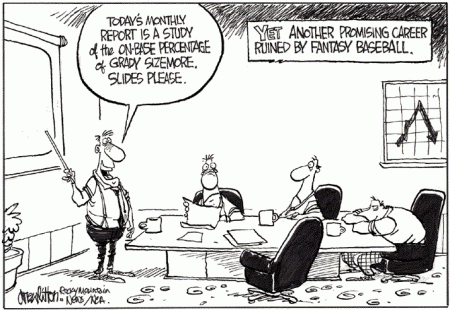A decade of fantasy sports
In a similar vein to Chris Jaffe’s spirit yesterday in his column, I figured I would forgo the traditional article highlighting some player or detailing some strategy I come up with and instead write a lighter piece on fantasy sports in general.
Lately I’ve come across a lot of “Best of the Decade” or “A Decade in Review” type lists in newspapers and magazines, and on television. It is amazing how the events of the past decade grow farther and farther into the past, and how they feel like they happened long ago when cataloged into lists such as “Most Influential Internet Moments of the Decade.“
Similarly fantasy sports has come a long way since its inception in 1980 by writer Danny Okrent with his original Rotisserie League. Most of that change has come in the past decade with the usage of the internet that revolutionized fantasy sports from a time-consuming hobby reserved for fanatics to one that can be played casually with little commitment (though still can be time-consuming if one so chooses).
 |
| © Drew Litton (More cartoons at DrewLitton.com) |
Although I was too young to be such a person, I’ve talked with people who played fantasy sports before the internet version arrived and heard them reminisce about keeping track of fantasy leagues through faxing and calling league members up on the phone to discuss trade offers only to be embarrassed when the person’s wife answers. All of that was thrown out the window when commissioner.com (now CBSsports) offered league hosting (for a fee) and RotoNews (now RotoWire) offered immediate news updates on all players for the first time in 1997.
Yahoo Sports took the online boom to a new level in 1999 when it began offering hosting of fantasy leagues for free. To read their initial press release announcing the free fantasy leagues, click here. As for that A-Rod Club they started, that was an interesting experiment that seems to have deteriorated quickly.
As fantasy sports have grown (to something around 30 million+ people nowadays in North America), they have had a major impact on the “actual sports” they simulate. From the individual fan’s perspective they have greatly increased knowledge of players on all teams, not just the local team. Without fantasy sports who would care about the minutia of the Cincinnati Reds outfield?
With that extended fan interest beyond just local teams comes a lot of extra revenue for sports in the form of larger TV deals, higher advertising prices, and greater sales of packages such as NFL Sunday Ticket and MLB.TV. According to a study by a University of Mississippi professor, fantasy sports has a $3 billion to $4 billion economic impact on the sports industry, and that makes me wonder why MLB Advanced Media and the Players Association would try to prevent fantasy sports sites from using players’ names and stats without a licensing agreement in 2007. Luckily the courts ruled in favor of the fantasy sports sites saying: “It would be strange law that a person would not have a First Amendment right to use information that is available to everyone.”
Fantasy sports have truly come a long way and every year there seems to be some improvement with interfaces and new features added. I am not sure what the future of fantasy sports will look like, but I can say I am excited to see how the game evolves in the years to come.